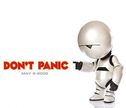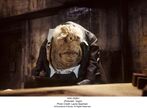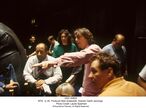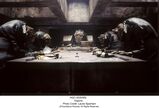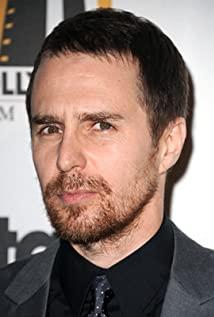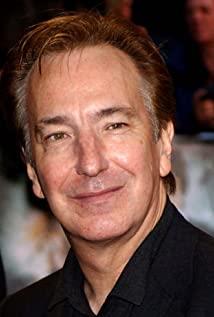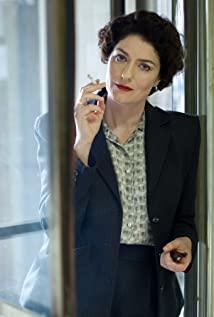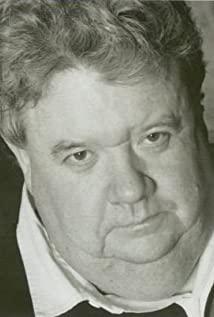"The answer to that great question about life and the universe and everything is..."
"42," Deep Thought said with infinite majesty and a calm tone.
Fifteen years ago today, The Hitchhiker's Guide to the Galaxy was released in the UK. Even if some people have not seen this movie, they will know that "42" is the ultimate answer to everything. The film succeeded in bringing the charm of Douglas Adams' original novel from the late 1970s to the new century in a more "high-tech" way, and captured the hearts of many fans with a tone attribute different from most sci-fi movies, which still remains today. Some people will tie it with "Zombie Shaun", "Two Smoking Guns" and other films as masterpieces of British humor, and this credit is inseparable from the appropriate adaptation of the original book and film.
It's a big feature of the original book. Ford's "The Hitchhiker's Guide to the Galaxy" is more like a collection of author's brain holes in the name of an encyclopedia. Whenever a character's dialogue jumps out of a new term, the guide will insert it and explain the noun in a fairy-tale tone. And the movie takes advantage of its visuals to turn various guide annotations into animations for the protagonist (and the audience) to understand. Another characteristic is its more exposed British humor. Many of Douglas's satires and jokes in the original book have been moved into the movie intact, such as the ironic contrast of the protagonist's house being demolished and the earth being "demolitioned" at the beginning of the movie. , what is even more surprising is that the more difficult word game in the movie was also replaced by the main creator with a "helper" section that does not reduce the effect. Then there are a series of absurd and bold plot designs and appropriate film and television adaptations, such as mice making the earth, and a unique British humorous sci-fi was born.
But looking back today, the adaptation of this sci-fi work is actually not excellent. One of the regrets is that the front and rear of the film are split. The first half of the film is completely copied from the original book, with only a few details deleted. In the second half, the main creators suddenly became enlightened and decided to adapt the script in a more popular and cinematic way. It does make the logic of the movie clearer and easier to understand to a certain extent, but for the original party, the adaptation of the second half is too abrupt, and for the non-original party, the first half is too fan-oriented, and it is difficult for passers-by for a while. Incorporating the escaping logic of the film and the nonsensical worldview, the look and feel is somewhat chaotic. The handling of part of the film is also a great pity. In the original work, the author vigorously satirized a series of propositions such as religion, philosophy, and society, which are all fun to read. Perhaps the film adaptation has smoothed the edges and corners to better cater to the public. The love line that does not exist in the novel ends with a family-like embrace of beauty, which inevitably makes the philosophical thinking of the original "man and the universe" fall into a rut.
So what makes a good sci-fi adaptation? Maybe The Martian, which also has comedic elements, can answer that question. As far as the quality of the film itself is concerned, it may not satisfy everyone, but the film's adaptation of the original book is undoubtedly worth learning from. The novel adheres to the positive attitude of "Robinson in Space" from beginning to end, uses various hard-core professional knowledge to overcome many difficulties, and the male protagonist's jokes, foul language and self-deprecating all the time, these characteristics make "The Martian" one of the other anti-heroes. Utopia, Technological Reflection, and many other science fiction novels. The film retains all the advantages of the original work, and presents the psychological descriptions that are difficult to film by the male protagonist in the form of video logs. At the same time, technical consultants are hired to strengthen the film's hard sci-fi attributes. However, the most eye-catching feature of the whole movie is actually the director's adaptation of the ending. The movie changed from the original Lewis' dispatch of subordinates to the rescue of Watney by Chief Lewis himself. From the abandonment of the rescue at the beginning of Lewis' film to the personal battle at the end, the character arcs of the supporting characters are also more complete and fuller, making up for the shortcomings of the hasty ending of the original work, and the third act is more in line with the logic of the film.
When we look further afield, we find that the relationship between the perfect sci-fi adaptation and the original is more subtle. 1982's "Blade Runner" did not use the PKD original "Do Androids Dream of Electric Sheep?" "The plot, but retains the general story frame and part of the setting, refines the original theme and re-creates, and the final effect is completely different from the original. Ridley Scott boldly weakens the story and uses advanced art design to construct a near-future black city that pays more attention to atmospheric experience, unconsciously laying the foundation for the aesthetic style of later classical cyberpunk. At the end of the film, Roy's dying monologue that makes the android humane makes the film's foothold and the original "defining people from human empathy" fall in a different direction.
As for another great sci-fi movie "2001: A Space Odyssey", since the script and the novel are almost synchronized at the same time, the mutual influence between the two is inevitable. In the preface of the millennium edition of the original book, Arthur Clark also described it in detail. The creative process of novels and screenplays. The original book is more like a detailed annotation of the movie, and many parts that the audience are not aware of will be more clearly understood by reading the original book. Even though the plots of the novel and the movie are roughly similar, the audience can still experience different pleasures from the different perspectives of the characters and stories of the two. In the part where the wonders are shown at the end, both of them have exerted the advantages of their respective carriers. Such a strange "interaction" sci-fi adaptation is unprecedented in history.
Thankfully, The Hitchhiker's Guide to the Galaxy isn't a great adaptation, but it doesn't suffer from a common problem with many sci-fi adaptations today -- visual effects first. Luc Besson's "Interstellar Agent" uses visual effects as a gimmick, and it ignores the most important main line along the way. "Alita" produced by Kashen uses top-level special effects to tell stories of failing grades, and there may be no sequels even before the grand worldview of the original is unfolded. And "Ghost in the Shell" has become a "landscape propaganda film" with Japanese elements and cyberpunk elements. The profound human-machine thinking of the original has become a Hollywood-style capital conspiracy. If a sci-fi adaptation movie only focuses on visual effects and loses the really important story and philosophical connotations, no matter how restored the scene is, it will be an empty shell without a soul.
The inheritance of the original British humor, a more popular adaptation, a more distinctive character setting, and an ingenious display of the spectacle and sci-fi setting... The movie "The Hitchhiker's Guide to the Galaxy" is more suitable for the adaptation of the modern background. Although it is not perfect, But it has still been respected and remembered by some fans, and it is still talked about today 15 years later. Maybe this is another successful adaptation in another sense.
View more about The Hitchhiker's Guide to the Galaxy reviews



